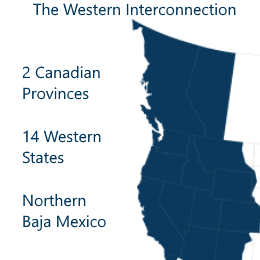
About WECC
The Western Electricity Coordinating Council (WECC) is a non-profit corporation that exists to ensure a reliable Bulk Electric System in the geographic area known as the Western Interconnection. WECC has been approved by the Federal Energy Regulatory Commission (FERC) as the Regional Entity for the Western Interconnection. The North American Electric Reliability Corporation (NERC) delegated some of its authority to create, monitor, and enforce reliability standards to WECC through a Delegation Agreement.
 WECC promotes bulk power system reliability and security in the Western Interconnection. WECC is the Regional Entity responsible for compliance monitoring and enforcement and oversees reliability planning and assessments. In addition, WECC provides an environment for the development of Reliability Standards and the coordination of the operating and planning activities of its members as set forth in the WECC Bylaws.
WECC promotes bulk power system reliability and security in the Western Interconnection. WECC is the Regional Entity responsible for compliance monitoring and enforcement and oversees reliability planning and assessments. In addition, WECC provides an environment for the development of Reliability Standards and the coordination of the operating and planning activities of its members as set forth in the WECC Bylaws.
There are six Regional Entities given authority by NERC and FERC. Of those six entities, WECC oversees the largest and most geographically diverse region, known as the Western Interconnection. WECC’s footprint extends from Canada to Mexico and includes the provinces of Alberta and British Columbia, the northern portion of Baja California, Mexico, and all or portions of the 14 Western states between.
Membership in WECC is open to all entities that meet the qualifications in the WECC Bylaws. WECC strives for transparency and open participation in all of its meetings and processes.

WECC began in 1967 as the Western Systems Coordinating Council (WSCC), a group of 40 power systems with a common goal of providing reliable power to the public whom they served. WSCC was staffed by various utilities assigned to work for the group until 1994, when WSCC incorporated and gained its own employees and board of trustees.
In 1996, a series of significant, systemwide disturbances led to the creation of the Reliability Management System, with members voluntarily accepting reliability standards, compliance, and penalties. In 2002, by the merger of three regional transmission associations—WSCC, the Western Regional Transmission Association, and the Southwest Regional Transmission Association—WECC was officially formed.
In 2005, Congress passed the Energy Policy Act. Section 215 of this act called for mandatory, enforceable reliability standards for all users, owners, and operators of the Bulk Power System (BPS). To develop these standards, an Electric Reliability Organization (ERO) was established. This directive also allowed for the ERO to delegate its enforcement responsibilities to a regional entity, allowing WECC to adopt this role.
To allow for the development and practice of the regional reliability standards, WECC formed its compliance department, effectively tripling its staff. In 2007, WECC was designated as the Regional Entity for the Western Interconnection with the authority to create, monitor, and enforce reliability standards. By 2014, WECC had divested its Reliability Coordinator and Interchange Authority functions.
Today, with over 140 employees, WECC exists as a 501(c)(4) social welfare organization, serving the public interest, focusing on mitigating risks to the reliability and security of the BPS in the Western Interconnection with an impartial and unbiased voice.